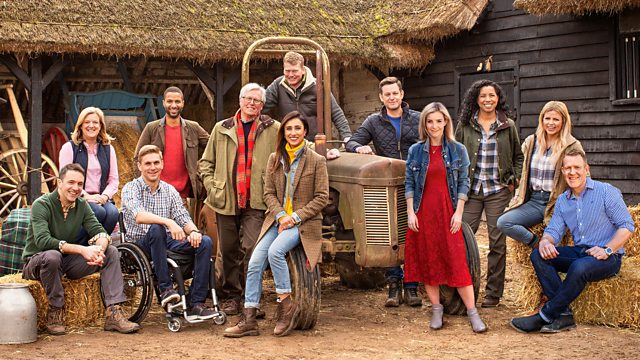
30/09/2012
Julia Bradbury and John Craven explore the Usk Valley. Julia finds out what is being done to conserve eels in its rivers and lakes, while John meets the lesser horseshoe bat.
Julia Bradbury and John Craven explore the Usk Valley. Known as the gateway to Wales, the Usk is less well known than its neighbour, the Wye, but it certainly matches it in beauty. Julia finds out what is being done to conserve eels in its rivers and lakes, while John takes a look at the building providing the perfect home for one of our rarest creatures - the lesser horseshoe bat.
Elsewhere, Tom investigates how a comeback in coal is affecting our countryside and the communities that live there. And Adam shows his top rams at a rare breed show and sale, where he is hoping they will catch the judge's eye and win a rosette or two.
Last on
Gateway To Wales

Julia Bradbury explores the Gwent Levels at the mouth of the Usk Valley. She discovers how modern technology is maintaining ancient drainage ditches for the benefit of farms, homes and wildlife. Joined by the Gwent Wildlife Trust and the Bumblebee Conservation Trust, Julia also finds out how careful management of this prime landscape is protecting one of our rarest little pollinators – the Shrill Carder Bee.
Usk Valley Eco Walk

A stroll up the lush green valley of the River Usk will take you past farmsteads, fishing spots and ancient forts. It is a glorious 48 miles of heavenly Welsh scenery. Johns meets locals along the way who are keeping the valley green and prosperous. He talks to volunteers who are generating cash for the community and to a farmer called John Lilly who has taken to manufacturing his own electric cars.
Opencast Mining

At peak times, as much as half the electricity we use in the UK is produced by burning coal, but the deep pit shafts of the past have now made way for more visible opencast coal mines. The high price of coal and a relaxation in planning laws means more opencast mines could soon be opening across the UK. Tom Heap travels to rural Northumberland to meet a community fighting against a proposed mine near their homes. So, should the national need to exploit our fossil fuels come before the views of those living next to deposits of coal?
Water Voles

The Gwent Levels is one of the largest surviving areas of ancient marsh systems in Britain, and a hot spot for archaeology and wildlife. The tapestry of reed-rich ditches provides the perfect habitat to help revive the UK’s water vole population. Julia is meeting the captivity-bred water voles being acclimatised to their new home and helps to release the first of the bunch into the wild.
Eel Release

Once a major source of food for the less wealthy, the secretive European Eel with it bizarre life cycle is now a critically endangered species. Julia learns how Dr John Taylor from the Environment Agency is working to preserve this important species. Then she helps a school group release twenty thousand young eels into the wild.
Lesser Horseshoe Bats

After decades of losing habitat and roosting sites, the Lesser Horseshoe Bat is now one of the rarest bats in the UK. But hidden deep in the Usk Valley is Europe’s biggest maternity roost, home to over 900 mums and pups. John Craven joins the Vincent Wildlife Trust to watch the spectacle of the bats’ evening flight. He also discovers why the valley’s derelict WWII defences could hold the key to the survival of the species.
Adam Henson At The Show And Sale

����
Credits
| Role | Contributor |
|---|---|
| Presenter | Julia Bradbury |
| Presenter | Julia Bradbury |
| Presenter | John Craven |
| Presenter | John Craven |
| Presenter | Tom Heap |
| Presenter | Tom Heap |
| Presenter | Adam Henson |
| Series Producer | Teresa Bogan |
| Presenter | Adam Henson |
| Series Producer | Teresa Bogan |
